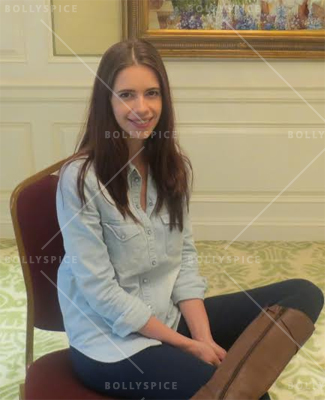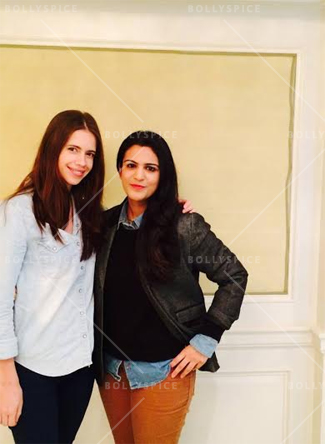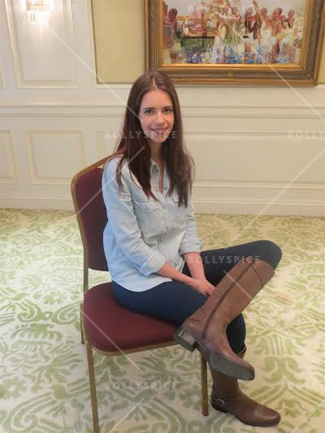 Being your self is never easy.
Being your self is never easy.
However, finding ourselves is a journey and challenge that each one of us must undertake in our own unique way.
Kalki Koechlin’s character Laila (Margarita, with a straw; Dir. Shonali Bose) portrays an inspirational woman fighting a battle to be herself – regardless of whether considered “normal” by societal standards or not.
Laila has cerebral palsy, a neurological condition affecting movement and coordination. Her disability provokes different reactions, negative and positive. Despite the challenges and discrimination that life throws her way, Laila is a determined individual full of dreams and of love.
Laila likes boys.
Laila also discovers that she likes Khanum (Sayani Gupta), a girl.
Falling in love and having a relationship with Khanum begins another strand of self-discovery and self-acceptance within her journey.
Being lesbian, gay, bisexual or transgender is still hugely frowned upon within the South Asian community – no matter which corner of the world you are in. Many LGBT persons struggle with self-acceptance and acceptance within the family.
Love is a human right.
To be who you are without fear and discrimination is a human right.
Expressing this message Margarita, with a Straw is a brave and honest portrayal of love and following one’s heart.
BollySpice’s Aashi Gahlot caught up with Kalki Koechlin to explore human courage, Bollywood’s portrayal of homosexuality, the issue of izzat (honour and shame) within South Asian society and what Kalki is taking away from playing Laila.
Kalki shares her advice on coming out as Lesbian, Gay, Bisexual or Transgender and her thoughts to parents of LGBT persons.
Aashi Gahlot: Where do you feel courage comes from? Your character is so courageous and a true role model for many. How do you feel courage is provoked?
Kalki Koechlin: I think partly what makes people strong is situation and experience. You know, people are not strong. I don’t think people are just generally strong. It’s really what they experience in life. So in this case with Laila’s battle, courage comes from the difficulties that she has with the way the world looks at her, with the way she’s not accepted and having to constantly fight that. And she does it with a sense of humour. She does it with this positive energy. She is not this negative rebel who is always like F the world and all that you know! She does it with a sense of humour and I think that is a beautiful battle. I think for me a sense of humour is one of the best weapons you can have in the world.
 AG: What are you personally taking away from the journey of playing the part of Laila?
AG: What are you personally taking away from the journey of playing the part of Laila?
KK: I’ve taken away a lot. I’ve taken away education and awareness about cerebral palsy for sure because I knew very little about it before hand. And I’ve gained a lot of friends. I guess I take away a sense of ownership – every time I do a role people are like: Oh! How do you do such a bold role? Why did you go and do that? Aren’t you afraid about your career? And things like that. I’m constantly dealing with those questions and I feel like I’ve really gone as far as I possibly can with a film like this one when it comes to being bold you know. I’ve tackled disability. And bisexuality. So for me there’s no more damage that can be done in a sense. I’m not afraid to explore those things anymore because it’s already done – whatever damage has been done to my career or whatever! So I think yeah, it’s kind of a sense of strength that I have now that I’ve done this film- that you know there’s no role too scary or too challenging to explore.
AG: What is your advice to a parent who has had a child come out as lesbian, gay, bisexual, transgender or queer?
KK: That’s a tough question. I think I would say that they listen to this person who is in front of them and kind of step outside of the mother/father role for a moment and see it as another human being- a human being to another. I think the minute it’s personal, it’s much harder to accept. We can accept a gay person if they are not in our household. But I’ve seen this very often where people are like I’m fine with gay people. But then I don’t want my kids to know about it – you know? So I think that’s really important- to step outside of yourself and just deal with the person in front of you like another human being and an adult. Because that’s another thing we have trouble doing is parents accepting own kids becoming adults. You know, we still treat them as we treated them when they were kids. So yeah, I think that’s really important to realise that at some point they also need to grow and take responsibility as human beings.
AG: What is your advice to somebody who wants to come to their parents as Lesbian, Gay, Bisexual, Transgender or Questioning?
KK: I think it’s really a very personal decision. You know your parents better than anybody else. So it’s really – you know when you’re ready. I don’t think parents are ever ready! But you’ve got to know that you have the strength to do it. There’s a part in our life where we all feel that, like Laila did, to be honest. To need to be honest. Before that you know, whoever we are, we lie about things in our childhood, we lie about things in our teenage years. Then there comes a point where we say: No enough! I want to be myself. I want to stop pretending. I want to stop wearing that because that’s what I’m supposed to wear. Or doing this because that’s what I’m supposed to do. I think only you know from inside when that time is right. So, yeah. When that time is right you’ve just got to go out and do it!
 AG: What’s your opinion on the “honour and shame” aspect that is so prevalent in South Asian Society?
AG: What’s your opinion on the “honour and shame” aspect that is so prevalent in South Asian Society?
KK: Honour and shame. There’s definitely this thing where we are stuck in the past. Especially people who moved to England from India generations ago. You know they really struggled and they came here. And they sort of had to stick together as a community so they became very I think nostalgic about India. While meanwhile India sort of moved forward and here – I’ve seen this – the people here are stuck in time for 30 years ago. So I think it’s really important to sort of break out of that and mingle with everybody. And realise that your kids are now English- I mean your kids are here so you no longer can have a little India in the middle of England. It’s really important to realize that.
And it’s the same in India you know, the generation gap is huge. Young kids are traveling the world, getting exposed to the internet. It’s impossible to keep them in that cultural framework that was once what it was in India. I think we’ve always had this in cultures but history has repeatedly shunned these things – actually if you look into Hinduism there is a lot of open sexuality but then we kind of have a history of – actually a Victorian hang-over from the English occupation which again made things very conservative and everybody went back to saying: being Indian is not wearing jeans! Being Indian is wearing a sari. I think it’s a very superficial and closed way of looking at it.
So I think it’s about being aware of the world around you and constantly re-educating yourself. There’s no stopping as far as learning is concerned. I don’t think education stops. We all need to constantly re-adapt ourselves. I’m re-adapting! I have a 7 year old little brother so I’m constantly feeling like I’m old fashioned. It never ends you know. There’s a constant evolution that needs to take place in human beings and I think it’s really important.
AG: You know what really upsets me about Bollywood? It’s how homosexuals are stereotyped and mocked. For example Dostana – a really ground-breaking film where a mother accepts her “gay” son. However, there is an element of making fun of homosexuals and heavy stereotyping. When do you think Bollywood will make a film celebrating same-sex love? Is it ever going to happen? Section 377, the law re-criminalizing homosexuality is back in India now. What is it going to take?
KK: It’s going to take a lot. It’s going to happen through commercial cinema I don’t think anytime soon. I think it’s going to happen in these sidelines. I think Aamir Khan is a huge supporter and he’s talking about it in his show Satyamev Jayate. So that’s one show that I think he’s really done a great job of speaking to the people because television really goes out to the masses. I think that’s a fantastic platform but I think it’s going to take a long time for commercial cinema because we are not even at the point where we can write a real story of any kind- very rarely.
We are in the business of escapism. And that’s fine. That’s okay you know. We have franchise films all over the world- you get your Superman’s and all those films. And you have that. But I think we are still lacking in real cinema. We are still young in that sense when it comes to real independent cinema. And that’s starting to get pushed. I think now films are getting recognized in film festivals and so then they are releasing. There is an audience. It’s an urban audience. It’s a small niche audience but it’s starting to happen.









